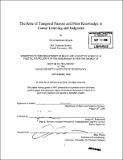The role of temporal factors and prior knowledge in causal learning and judgment
Author(s)
Krynski, Tevye Rachelson
DownloadFull printable version (23.77Mb)
Other Contributors
Massachusetts Institute of Technology. Dept. of Brain and Cognitive Sciences.
Advisor
Joshua B. Tenenbaum.
Terms of use
Metadata
Show full item recordAbstract
Causal relationships are all around us: wine causes stains; matches cause flames; foods cause allergic reactions. Next to language, it is hard to imagine a cognitive process more indicative of human intelligence than causal reasoning. To understand how people accomplish these feats, two major questions must be addressed: how do people acquire knowledge of causal relationships (causal learning), and how do people use that knowledge to make predictions and draw inferences (causal judgment)? The first part of this thesis is concerned with causal learning, and draws on the foundation of Bayesian inferential frameworks (e.g., Tenenbaum, Griffiths, & Kemp, 2006) to explain how observable data can be used to infer causal relationships between events. I will argue that rapid causal learning from small samples can be understood as rational inference over a representation of causality that includes a temporal delay between cause and effect. Experimentally, I show that people learn causal relationships faster when the temporal delay between cause and effect is less variable, just as is predicted by a rational statistical model of event causation. I argue that people's tendency to learn better from short delays is an artifact of the fact that short delays are inherently less variable. (cont.) The second part of this thesis is concerned with causal judgment, and draws on the foundation of knowledge-based Bayesian networks to show that it is often more rational to make judgments using causal frameworks than purely statistical frameworks. Deviations from traditional norms of judgment, such as "base-rate neglect" (Tversky & Kahneman, 1974), can be explained in terms of a mismatch between the statistics given to people and the causal models they intuitively construct to support probabilistic reasoning. Experimentally, I provide evidence that base-rate neglect may be an artifact of applying causal reasoning to purely statistical problems. Six experiments show that when a clear mapping can be established from given statistics to the parameters of an intuitive causal model, people are more likely to use the statistics appropriately, and that when the classical and causal Bayesian norms differ in their prescriptions, people's judgments are more consistent with causal Bayesian norms.
Description
Thesis (Ph. D.)--Massachusetts Institute of Technology, Dept. of Brain and Cognitive Sciences, 2006. Includes bibliographical references (leaves 189-193).
Date issued
2006Department
Massachusetts Institute of Technology. Department of Brain and Cognitive SciencesPublisher
Massachusetts Institute of Technology
Keywords
Brain and Cognitive Sciences.